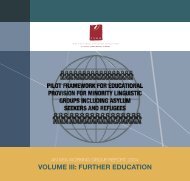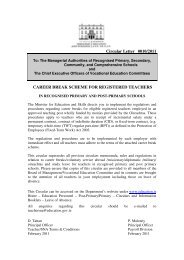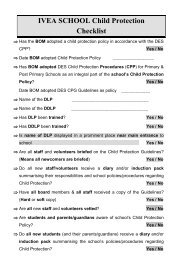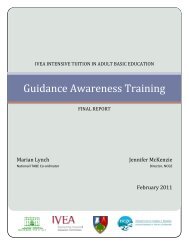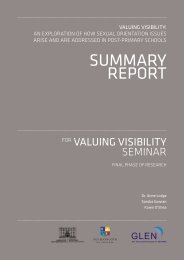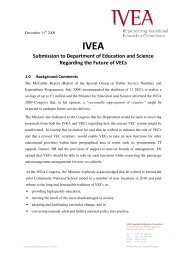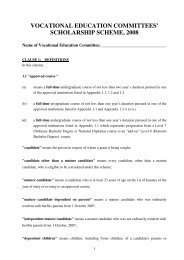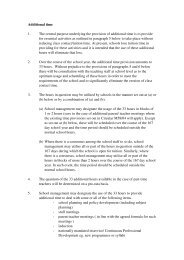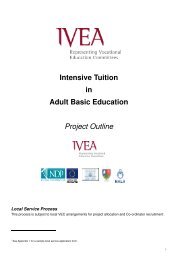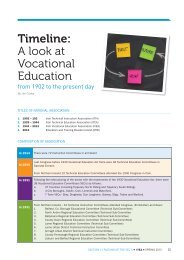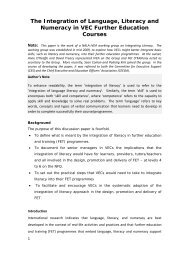(ITABE)... - Department of Education and Skills
(ITABE)... - Department of Education and Skills
(ITABE)... - Department of Education and Skills
You also want an ePaper? Increase the reach of your titles
YUMPU automatically turns print PDFs into web optimized ePapers that Google loves.
Key Area Guidelines ~ IVEA Intensive Tuition in Adult Basic <strong>Education</strong> Guidelines - April 2012<br />
knowledge based categories - speaking & listening, reading, writing <strong>and</strong><br />
numeracy.<br />
It is accepted that the model <strong>of</strong> adult basic education provision operated by<br />
adult literacy services equally values other areas <strong>of</strong> development such as<br />
fluency, independence <strong>and</strong> transferability, as means to improve social<br />
participation. This model also values progress made in s<strong>of</strong>t skills essential<br />
to both social interaction <strong>and</strong> the improvement <strong>of</strong> skills <strong>and</strong> knowledge.<br />
Given the restrictions imposed by time <strong>and</strong> the absence, <strong>and</strong> in many<br />
opinions inappropriateness, <strong>of</strong> summative assessment statements to<br />
measure s<strong>of</strong>t skills, these improvements are recorded as part <strong>of</strong> the<br />
qualitative data gathered within the evaluation process.<br />
Assist in curriculum development / lesson planning<br />
Given the fact that the summative measurement <strong>of</strong> skills <strong>and</strong> knowledge<br />
requires the use <strong>of</strong> the same pre <strong>and</strong> post course statements it is logical<br />
that if progress is to be measured some <strong>of</strong> the gaps identified should be<br />
addressed through the tuition programme.<br />
This need not dictate the curriculum for the project. The agreed curriculum<br />
should address the expressed <strong>and</strong> assessed needs <strong>of</strong> the participating<br />
learners <strong>and</strong> relevant gaps identified through the <strong>ITABE</strong> assessment<br />
process can be embedded into the planned learning outcomes.<br />
Monitor progress<br />
Again it must be borne in mind that the assessment checklists only<br />
measure progress in the specific areas for which they were designed -<br />
speaking & listening, reading, writing <strong>and</strong> numeracy. In addition it should be<br />
noted that measuring progress in relation to each <strong>of</strong> the checklist<br />
statements can only take place if opportunities to improve identified<br />
weaknesses are included in the course activities.<br />
It is recommended that progress made in areas <strong>of</strong> learning other than those<br />
measured through use <strong>of</strong> the Assessment Pack should also be documented<br />
<strong>and</strong> may be submitted with assessment documentation.<br />
Provide a common reference point<br />
There is a need to provide a common reference point when attempting to<br />
capture a national picture <strong>of</strong> needs <strong>and</strong> progress. Therefore the use <strong>of</strong> the<br />
same assessment materials, even bearing in mind the need for the<br />
interpretation <strong>of</strong> results, can provide that commonality, especially where the<br />
materials are mapped to the NFQ.<br />
Generate statistical data<br />
In order to generate a national picture <strong>of</strong> the benefits <strong>of</strong> intensive tuition it is<br />
necessary to use a measurement system which can be related to national<br />
(NFQ) education levels.<br />
10



